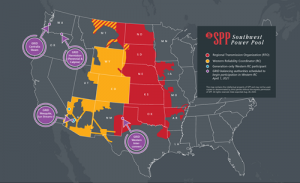
If federal regulators approve it, the Southwest Power Pool’s 14-state region which includes Oklahoma, will expand to include parts of Colorado and other western states.
The SPP announced that it filed on June 4 a request with the Federal Energy Regulatory Commission, amendments to its tariff to include provisions specific to its western members. Pending FERC’s approval, SPP will become the first organization in the U.S. to provide full regional transmission organization (RTO) services in both the Eastern and Western Interconnections of the nation’s power grid beginning in early 2026.
“Years of collaboration among SPP staff, existing RTO members and western entities has resulted in a revised tariff that meets the unique needs of all the entities we serve, and I couldn’t be more thrilled,” said SPP President and CEO Barbara Sugg.
“The revised RTO tariff improves the reliability of the electric grid and provides economic benefits for entities in both the Eastern and Western Interconnections.”
The entities pursuing RTO membership or expanded participation as part of the expansion of the SPP RTO are Basin Electric Power Cooperative; Colorado Springs Utilities; Deseret Power Electric Cooperative; the Municipal Energy Agency of Nebraska (MEAN); Platte River Power Authority; Tri-State Generation and Transmission Association; and the Western Area Power Administration Colorado River Storage Project, Rocky Mountain region and Upper Great Plains region. These are the first western entities to participate in SPP’s Integrated Marketplace in the Western Interconnection.
“As we pursue a new energy future, we’re excited the RTO effort has reached this milestone,” said Travas Deal, Colorado Springs Utilities chief executive officer. “The RTO offers unprecedented access to regional transmission and generation resources that will help us reach our emission reduction goals, add more renewable energy, manage customer costs and ensure the reliability of our electric grid.”
In its press release, the SPP declared that expansion of the SPP RTO will create economic and reliability benefits for all member companies through access to a larger generation fleet, greater geographic diversity and increased efficiencies in SPP’s energy markets by using an optimized solution across the direct current (DC) ties that connect the Eastern and Western Interconnections.
Optimization of the DC ties’ use will increase resilience by leveraging diverse resources via the 510 MW of bi-directional DC tie capability. An estimate of more than $200M in annual benefit is expected for the joining western entities, adding to the $2.8B in benefits currently realized by existing RTO members.
“SPP’s potential RTO expansion into the Western Interconnect will help us to reduce our overall carbon footprint for MEAN’s power resources through the economic dispatch of a wholesale power market and maximize operational efficiencies of renewable resources,” said Brad Hans, Director of Wholesale Operations for MEAN. “As a member of SPP’s RTO in the Eastern Interconnect for several years, MEAN recognizes the benefits of participating in that market and the energy cost savings it provides as well as SPP’s member-driven business model.”
SPP’s inclusive and transparent governance structure will accommodate expansion of the RTO in the West with minimal impact to current processes. Representatives from the seven western entities will serve on the SPP Members Committee and the Markets and Operations Policy Committee. The Regional State Committee, which is comprised of regulatory commissioners from states in the RTO footprint, will grow by four seats representing the four states included in western expansion: Arizona, Colorado, Utah and Wyoming. A limited number of western-specific working groups will focus on issues impacting the western members.
“We enthusiastically look forward to Tri-State’s participation in the western expansion of the SPP RTO, which will reliably and cost-effectively advance our energy transition, while meeting our greenhouse gas reduction goals,” said Tri-State Generation and Transmission Association CEO Duane Highley. “The full benefits of the RTO, including a day-ahead market, an ancillary services market, efficient regional transmission planning, common transmission tariff and participatory governance model help us to further reduce costs for our cooperative members across the West.”
Source: press release




